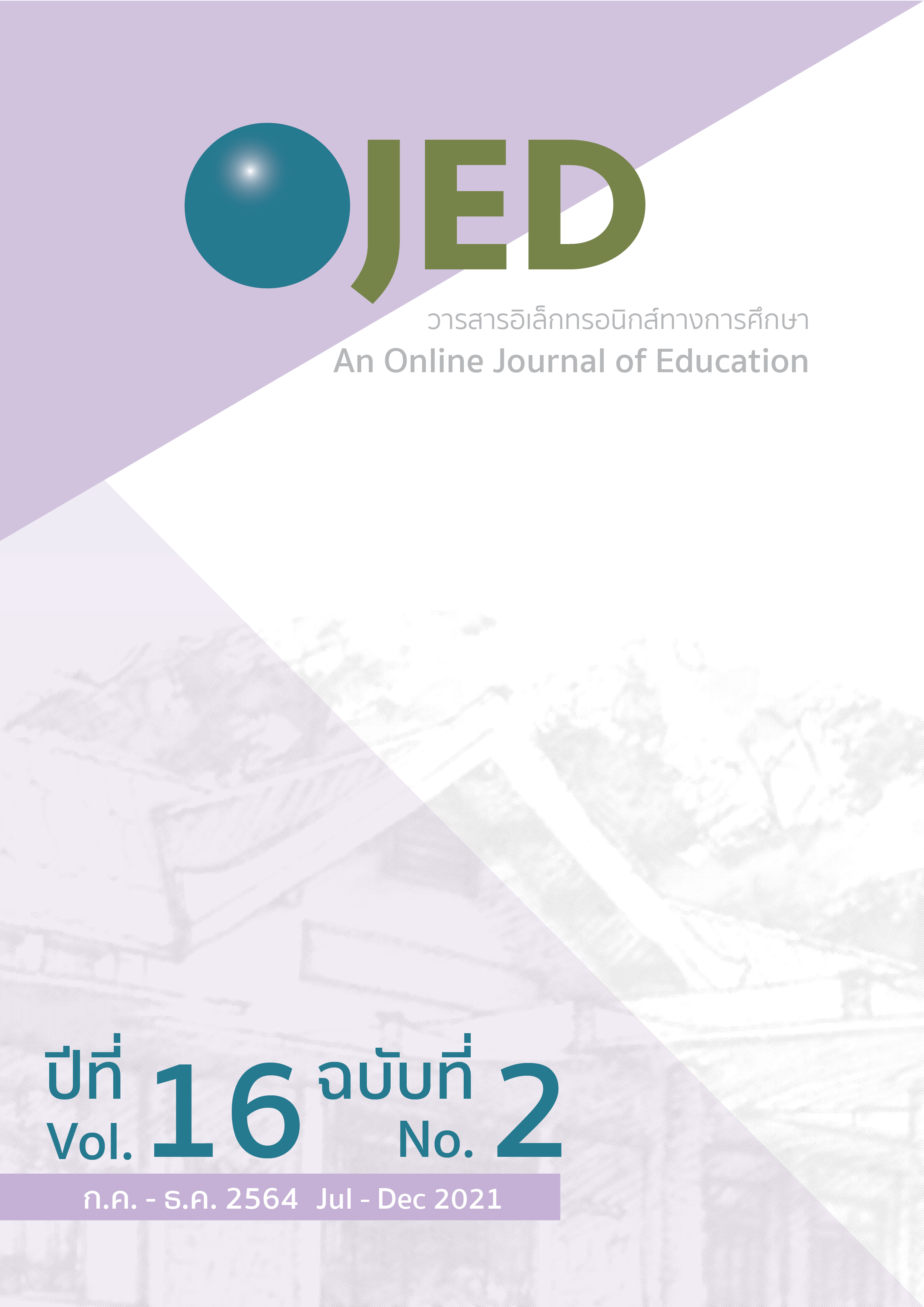States and Problems of Preschool Teachers in Organizing Anti-Corruption Raise Awareness Activities for Kindergarteners in Schools Attending Upright School Project in Chonburi Primary Educational Service Area Office 4
DOI:
https://doi.org/10.14456/ojed.2021.34Keywords:
anti-corruption raise awareness activities, preschool teachers, states and problemsAbstract
The purpose of this research was to study the states and problems of preschool teachers in organizing anti-corruption raise awarness activities for kindergarteners in schools attending upright school project in Chonburi primary educational service area office 4 in 4 aspects, namely education management planning aspect, education management aspect, media and environment preparation aspect, and learning outcome assessment aspect.The samples used in this research are 173 kindergarten teachers. The tools used in this research are surveys. Data are analyzed by analyzing frequency distribution, finding percentage value, and analyzing the content. The research findings of the kindergarten teachers in organizing activities were as follows. It has been found that in education management planning aspect, 97.11% of teachers determine objectives to encourage desirable characteristics in public consciousness. In education management aspect, 53.76% of teachers organize activities by all of the 4 steps, but not in order. In media and environment preparation aspect, 97.11% of teachers use media corresponding to children’s learning method. Lastly, in learning outcome assessment aspect, 78.61% of teachers use the outcome assessment to design activity management. As for the problems, it has been found that most of the teachers (98.66%) haven’t training in Upright School Project, 90.60% of teachers lack understanding in activity management, 75.71% of teachers lack enough budget for purchasing media, and 65.19% of teachers haven’t used outcome assessment to improve their teaching method.
References
กระทรวงศึกษาธิการ. (2560). หลักสูตรการศึกษาปฐมวัย 2560. กรุงเทพมหานคร: สำนักวิชาการและมาตรฐานการศึกษา สำนักคณะกรรมการการศึกษาขั้นพื้นฐาน กระทรวงศึกษาธิการ.
สำนักงานคณะกรรมการการศึกษาขั้นพื้นฐาน. (2561). แนวทางการประเมินคุณภาพตามมาตรฐานการศึกษาระดับปฐมวัย ระดับการศึกษาขั้นพื้นฐาน และระดับการศึกษาขั้นพื้นฐานศูนย์การศึกษาพิเศษ. http://bet.obec.go.th/index/wp-content/uploads/2018/08/nn3.pdf
สำนักงานคณะกรรมการการศึกษาแห่งชาติ. (2560). แผนการศึกษาแห่งชาติ (พ.ศ. 2560-2579) ฉบับสรุป(พิมพ์ครั้งที่ 1). กรุงเทพมหานคร: สำนักงานคณะกรรมการการศึกษาแห่งชาติ สำนักนายกรัฐมนตรี.
สำนักงานคณะกรรมการป้องกันและปราบปรามการทุจริตแห่งชาติ. (2561). หลักสูตรรายวิชาเพิ่มเติม“การป้องกันการทุจริต”. https://www.nacc.go.th/article_attach/18575_20180430191900.pdf
สำนักงานคณะกรรมการพัฒนาการเศรษฐกิจและสังคมแห่งชาติ สำนักนายกรัฐมนตรี. (2559). แผนพัฒนาเศรษฐกิจและสังคมแห่งชาติ ฉบับที่สิบสอง พ.ศ. 2560 - 2564. http://www.nesdb.go.th/ewt_dl_link.php?nid=6422
สำนักพัฒนานวัตกรรมการจัดการศึกษา. (2558). แนวทางการจัดกิจกรรมการเรียนการสอน โครงการเสริมสร้างคุณธรรม จริยธรรมและธรรมาภิบาลในสถานศึกษา“ป้องกันการทุจริต” ปลูกจิตสำนึก ให้กับนักเรียน (ภายใต้ชื่อโรงเรียนสุจริต) ระดับปฐมวัย. https://drive.google.com/file/d/0BwkZ9a0DMAoUakxxd3FFTUNva1E/view
ศูนย์คุณธรรม (องค์การมหาชน). (2559). โครงการสำรวจสถานการณ์คุณธรรมของสังคมไทย. http://nidapoll.nida.ac.th/file_upload/poll/document/20160829042941.pdf
อาภรณ์ ใจเที่ยง. (2550). หลักการสอน. กรุงเทพมหานคร: โอเดียนสโตร์.
อวยพร เรืองตระกูล. (2553). สถิติประยุกต์ทางพฤติกรรมศาสตร์ 1. กรุงเทพมหานคร: ศูนย์ตำราและเอกสารทางวิชาการ คณะครุศาสตร์ จุฬาลงกรณ์มหาวิทยาลัย.
National Association for the Education of Young Children. (2009). Developmentally Appropriate Practice in Early Childhood Programs Serving Children from Birth through Age 8. https://www.naeyc.org/sites/default/files/globallyshared/downloads/ PDFs/resources/position-statements/PSDAP.pdf
Downloads
Published
How to Cite
Issue
Section
License
Copyright (c) 2021 An Online Journal of Education

This work is licensed under a Creative Commons Attribution-NonCommercial-NoDerivatives 4.0 International License.




